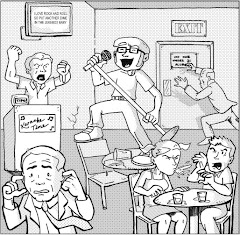writer: Mike Baron
penciller: Barry Crain
inker: John Nyberg
letterer: Steve Haynie
colorist: Lovern Kindzierski
editor: Mike Gold
I've been saving Sonic Disruptors #3 for today, Lincoln's birthday, for obvious reasons:

However, at the time of purchase, I didn't think that the guitar in Lincoln's lap would be just as appropriate as the very President's presence, if not more so, but with last night's Grammy Awards, the stars have aligned. For the next few days, the music industry will be on the lips of anyone enthralled with pop culture , and, ironically, Sonic Disruptors is about the suppression of all things music, reducing the otherwise dominating medium to an underground commodity at best. (Yes, I said dominating medium; all broadcast media, from radio to television to movies, depends on music for its success, and even communications technology like cellular phones and e-mail have incorporated the persuasive effects of music into their mass marketing scheme. Music is everywhere, plain and simple. But I digress.) Thus, I like the concept behind this comic book, but I'm not to fond of its implementation. Here's why.
First of all, writing a comic book about the music industry is akin to Howard Stern describing the hot model joining him in his studio -- as much as he compliments her bust size, his subject matter is in direct contrast to his chosen medium. Look at the page four of this issue. The artists can draw large amps and vein-popping rock stars all they want, the letterer can up the size of his SFX until they nearly obscure the page, but we readers can still only comprehend the material on a figurative level at best. This phenomenon handicaps "the comic book" as much as it compliments it; sure, we can't hear the music, but we know what we should be hearing, thanks to the use of some universally recognizable imagery and linguistic trickery. While I wonder why a writer would utilize the comic book medium to tell a story about the music industry, I can completely understand why an eager artist -- eager to tests his bounds -- would embrace it.
First of all, writing a comic book about the music industry is akin to Howard Stern describing the hot model joining him in his studio -- as much as he compliments her bust size, his subject matter is in direct contrast to his chosen medium. Look at the page four of this issue. The artists can draw large amps and vein-popping rock stars all they want, the letterer can up the size of his SFX until they nearly obscure the page, but we readers can still only comprehend the material on a figurative level at best. This phenomenon handicaps "the comic book" as much as it compliments it; sure, we can't hear the music, but we know what we should be hearing, thanks to the use of some universally recognizable imagery and linguistic trickery. While I wonder why a writer would utilize the comic book medium to tell a story about the music industry, I can completely understand why an eager artist -- eager to tests his bounds -- would embrace it.
As for the story itself, as I read this issue I searched every scrap of dialogue to find some semblance of continuity to grasp, some clear idea of the circumstances in this bold future that resulted in the ban of rock 'n roll music as we know it. I know that guitars are contraband, that the Secretary of Defense has lost this daughter to the underground movement, and that deejays and musicians alike seek refuge at an undisclosed location called "the Republic of Rock." While I was trying to get a grasp on this future, suddenly one of the key characters transports us to his past with an origin flashback. The plot was interesting enough, but I encountered some layer of resistance that simply didn't completely invest me. Perhaps if I picked up issue #1 instead of #3 . . .
Lincoln didn't have the luxury of starting at the beginning, either. We often mistake old Abe as one of our nation's founding fathers, what with his likeness on our currency and his birthday so close to Washington's, but if we remember the context of his famous Gettysburg Address, Lincoln himself implies his burden of our country's short but challenging history: "Four score and seven years ago . . ." He was only the sixteenth President, but already he was cleaning up the mess his predecessors left behind. If Sonic Disruptors is in any way accurate, our nation is destined to encounter such blunder every hundred years or so. Fortunately, guys like Lincoln often pop up to save the day. These heroes march to the beat of a different drummer . . . even if music isn't allowed.





No comments:
Post a Comment